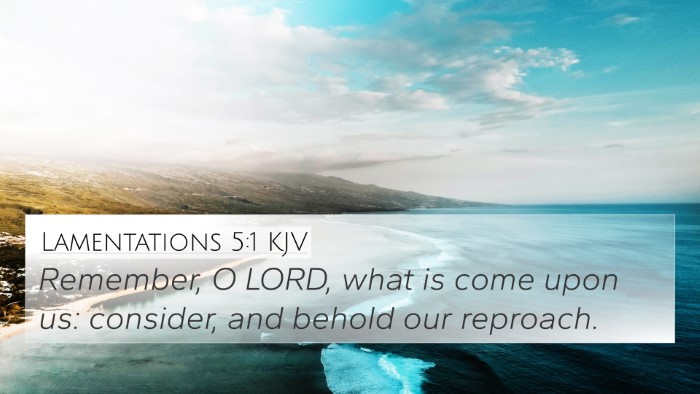Old Testament
Genesis Exodus Leviticus Numbers Deuteronomy Joshua Judges Ruth 1 Samuel 2 Samuel 1 Kings 2 Kings 1 Chronicles 2 Chronicles Ezra Nehemiah Esther Job Psalms Proverbs Ecclesiastes Song of Solomon Isaiah Jeremiah Lamentations Ezekiel Daniel Hosea Joel Amos Obadiah Jonah Micah Nahum Habakkuk Zephaniah Haggai Zechariah MalachiJob 10:15 Similar Verses
Job 10:15 Cross References
If I be wicked, woe unto me; and if I be righteous, yet will I not lift up my head. I am full of confusion; therefore see thou mine affliction;
Uncover the Rich Themes and Topics of This Bible Verse
Listed below are the Bible themes associated with Job 10:15. We invite you to explore each theme to gain deeper insights into the Scriptures.
Job 10:15 Cross Reference Verses
This section features a detailed cross-reference designed to enrich your understanding of the Scriptures. Below, you will find carefully selected verses that echo the themes and teachings related to Job 10:15 KJV. Click on any image to explore detailed analyses of related Bible verses and uncover deeper theological insights.

Isaiah 3:11 (KJV) »
Woe unto the wicked! it shall be ill with him: for the reward of his hands shall be given him.

Job 9:15 (KJV) »
Whom, though I were righteous, yet would I not answer, but I would make supplication to my judge.
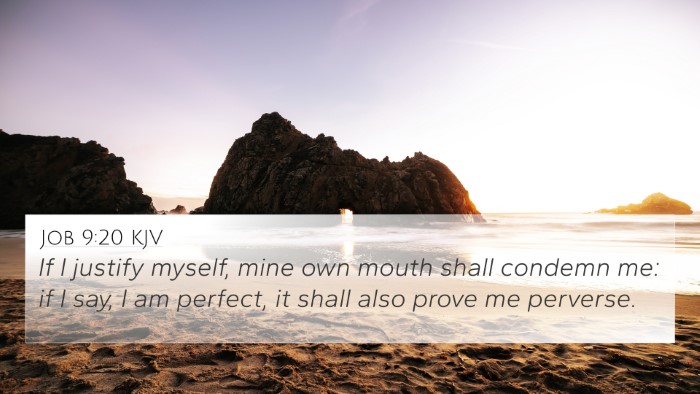
Job 9:20 (KJV) »
If I justify myself, mine own mouth shall condemn me: if I say, I am perfect, it shall also prove me perverse.
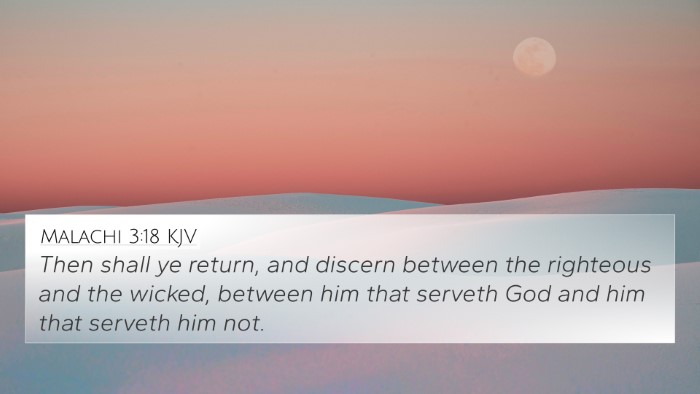
Malachi 3:18 (KJV) »
Then shall ye return, and discern between the righteous and the wicked, between him that serveth God and him that serveth him not.
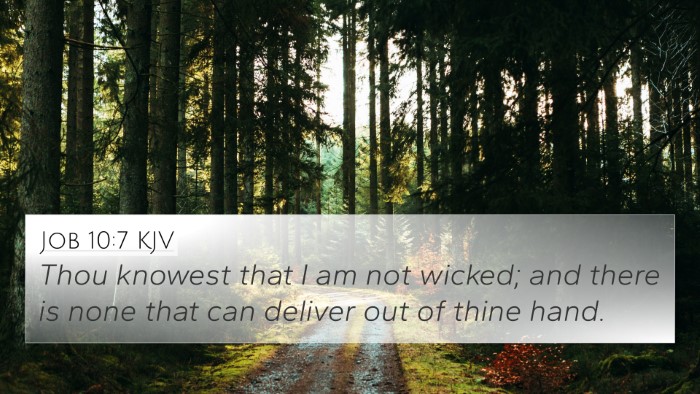
Job 10:7 (KJV) »
Thou knowest that I am not wicked; and there is none that can deliver out of thine hand.

Isaiah 6:5 (KJV) »
Then said I, Woe is me! for I am undone; because I am a man of unclean lips, and I dwell in the midst of a people of unclean lips: for mine eyes have seen the King, the LORD of hosts.

Exodus 3:7 (KJV) »
And the LORD said, I have surely seen the affliction of my people which are in Egypt, and have heard their cry by reason of their taskmasters; for I know their sorrows;
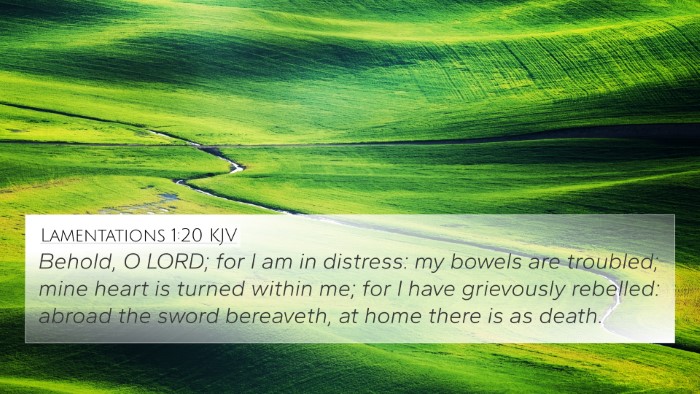
Lamentations 1:20 (KJV) »
Behold, O LORD; for I am in distress: my bowels are troubled; mine heart is turned within me; for I have grievously rebelled: abroad the sword bereaveth, at home there is as death.
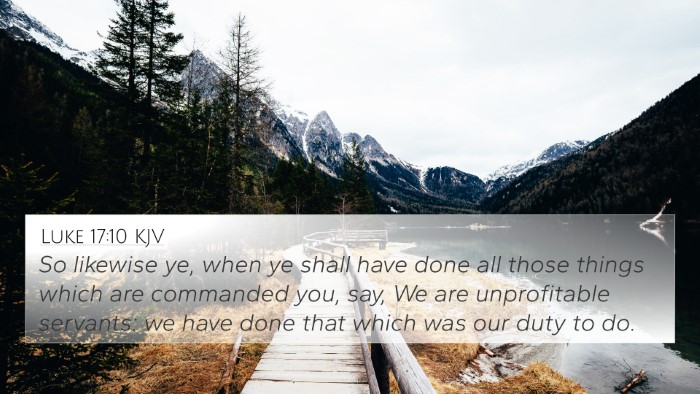
Luke 17:10 (KJV) »
So likewise ye, when ye shall have done all those things which are commanded you, say, We are unprofitable servants: we have done that which was our duty to do.

Isaiah 64:5 (KJV) »
Thou meetest him that rejoiceth and worketh righteousness, those that remember thee in thy ways: behold, thou art wroth; for we have sinned: in those is continuance, and we shall be saved.

Job 27:7 (KJV) »
Let mine enemy be as the wicked, and he that riseth up against me as the unrighteous.

Job 9:12 (KJV) »
Behold, he taketh away, who can hinder him? who will say unto him, What doest thou?

Romans 2:8 (KJV) »
But unto them that are contentious, and do not obey the truth, but obey unrighteousness, indignation and wrath,
Job 10:15 Verse Analysis and Similar Verses
Understanding Job 10:15
Job 10:15 states, "If I be righteous, yet will I not lift up my head: I am full of confusion; therefore see thou mine affliction." This verse encapsulates Job's struggle with his suffering and his quest for justice from God. It reflects the profound human experience of feeling overwhelmed by circumstances, even when one believes in their righteousness.
Summary of the Verse
In this verse, Job expresses a deep sense of confusion and affliction, suggesting that even in his righteousness, he feels unable to stand tall or find hope. He indicates a struggle with his self-worth and a desire for recognition of his suffering.
Insights from Commentaries
-
Matthew Henry:
Henry emphasizes that Job's humility is evident in his acknowledgment of his afflictions despite his righteousness. Job's confusion reflects the human tendency to wrestle with divine justice when suffering, indicating that adherence to righteousness does not guarantee immunity from hardship.
-
Albert Barnes:
Barnes highlights the feeling of desperation within this verse. He reflects on how Job's situation illustrates the trials of the righteous. Even those who live righteously may not always experience relief or justification in their own eyes, showcasing the complexity of faith amidst suffering.
-
Adam Clarke:
Clarke points out that Job's assertion signifies a deep inner turmoil. His dismay stems from the belief that his moral standing should shield him from such desolation. Clarke stresses the importance of understanding God's greater plans, even when individual circumstances appear harsh and unforgiving.
Cross-References of Job 10:15
- Job 13:23-24: Job seeks to plead his case before God, indicating the consistent theme of divine justice and human suffering.
- Psalms 38:4: The verse conveys a similar feeling of affliction where the Psalmist acknowledges his sinfulness before God.
- Psalms 51:17: This focuses on the humility and broken spirit necessary for repentance, paralleling Job's humility in his afflictions.
- Isaiah 57:15: Here, God comforts the humble and contrite, echoing the themes of Job’s struggles and God’s understanding of pain.
- Romans 8:28: This verse provides assurance that all things work for the good of those who love God, cultivating a sense of hope amid suffering.
- 2 Corinthians 12:10: Paul speaks about his weaknesses, aligning with Job’s attitude towards suffering as something that can lead to reliance on God's strength.
- Philippians 4:12-13: Paul describes contentment in hardship, an attitude Job eventually seeks to find.
Thematic Connections
Job 10:15 engages deeply with the themes of righteousness, suffering, and divine justice. Through Job's dialogue with God, we see a representation of human emotions regarding faithfulness in light of adversity. The connections with other scriptures further illuminate these ideas:
Connections between Bible Verses
-
The Righteous and Suffering:
Connecting with verses like 1 Peter 4:12 shows that suffering is not alien to the righteous; it serves as a trial of faith.
-
Human Confusion Before God:
Similar to Job’s expression, Habakkuk 1:2-3 shows a prophet questioning God's justice in alignment with suffering.
-
The Need for Divine Comfort:
See Isaiah 40:1-2, where God’s desire to comfort His people mirrors the need for affirmation and recognition in the face of tragedy.
-
Hope in Affliction:
Lamentations 3:32-33 reminds believers of God's compassion, encouraging them to maintain faith even when facing overwhelming trials.
Comparative Analysis with Other Biblical Texts
Job 10:15 initiates an inter-Biblical dialogue concerning the nature of suffering. When comparing Job's lamentations to the New Testament teachings on suffering, such as in James 1:2-4, we notice that trials are framed as opportunities for growth.
Identifying Connections between Old and New Testament
The contrast between Job's immediate despair and the call found in Romans 5:3-5 to rejoice in sufferings aids in formulating a comprehensive understanding of how suffering is perceived throughout the scriptures.
Conclusion
Job 10:15 is not merely a statement of personal despair; it symbolizes the overarching struggle of humanity with the divine plan. Through the insights gathered from various commentaries and thematic connections, believers are encouraged to explore their own faith journey in the face of adversity.
Explore additional tools for Bible cross-referencing:
- Bible concordance for identifying related scripture.
- Cross-reference Bible study guides for deeper insights.
- How to use Bible cross-references to enrich study.




